Home Tags Posts tagged with "Syria"
Syria
Albanian PM Edi Rama says his country will not allow the destruction of Syrian chemical weapons on its soil.
Edi Rama was responding to two days of protests in Tirana and other cities.
Albania recently destroyed its own chemical stockpile, and the US had requested that it host the dismantling of Syria’s arsenal.
Under the deal brokered by Russia to remove Syria’s chemical weapons, it was agreed that they should be destroyed outside the country if possible.
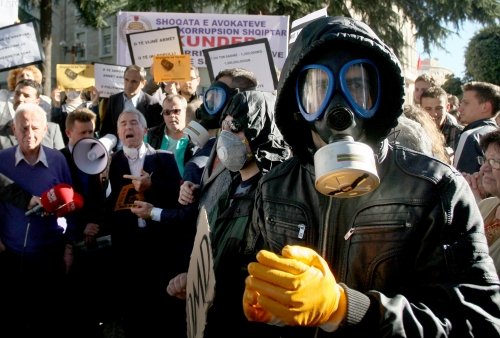
Albania will not allow the destruction of Syrian chemical weapons on its soil
Edi Rama attacked the Albanian opposition for having criticized the government’s willingness to consider the idea.
A key meeting of the Organization for the Prohibition of Chemical Weapons (OPCW) – the international watchdog supervising the destruction – had adjourned for several hours, awaiting Albania’s decision.
The OPCW needs to come up with an alternative quickly, as the deadline for a detailed plan on destroying Damascus’s toxic agents runs out on Friday.
France has been named as a possible alternative site for destroying Syria’s 1,000 or so tonnes of chemical arms.
Norway has pledged to send a civilian cargo ship and a navy frigate to Syrian ports to pick up the weapons and carry them elsewhere for destruction.
However, Norway said that it could not destroy the weapons on its own soil because it lacked the expertise.
[youtube IFdAtIf7q3k 650]
Israel has carried out a strike near the Syrian coastal city of Latakia, a US official says.
The official said the strike targeted Russian-made missiles intended for the Lebanese militant group Hezbollah.
Latakia is a stronghold of Syrian President Bashar al-Assad, an important port city where the Alawite community to which he belongs is concentrated.
Israel is widely reported to have carried out at least three air strikes in Syria so far this year.
While Israel rarely comments on specific operations, it has repeatedly said it would act if it felt Syrian weapons, conventional or chemical, were being transferred to militant groups in the region, especially Hezbollah.
Reports of the strike came as the Organization for the Prohibition of Chemical Weapons (OPCW) said all Syria’s declared equipment for making chemical weapons had been destroyed, one day before a deadline.

Israel has carried out a strike near the Syrian coastal city of Latakia
Action by the OPCW was agreed following allegations, denied by the Syrian government, that its forces had used chemical weapons in civilian areas – and after the US and France threatened military intervention.
A US official said the Israeli strike took place overnight from Wednesday into Thursday.
Reports circulated on Thursday of explosions near Latakia, but the cause was not clear.
“Several explosions were heard in an air defense base in the Snubar Jableh area,” said the Syrian Observatory for Human Rights, a UK-based activist network.
Neither Israel nor Syria have commented on the reports.
One unnamed US official told the Associated Press that the missiles targeted by Israel were Russian-made SA-125s.
Russia has been a key backer of President Bashar al-Assad’s, continuing to supply his government with weapons during the conflict in Syria.
Bashar al-Assad had promised to respond to any future strikes by Israel.
[youtube Qncya-9iKsA 650]
Syria’s declared equipment for producing, mixing and filling chemical weapons has been destroyed, sources with the Organization for the Prohibition of Chemical Weapons say.
An announcement by the OPCW is expected later – a day before its deadline which Syria had to meet.
Inspectors were sent to Syria following allegations that government forces had used chemical weapons in civilian areas, killing scores of people.
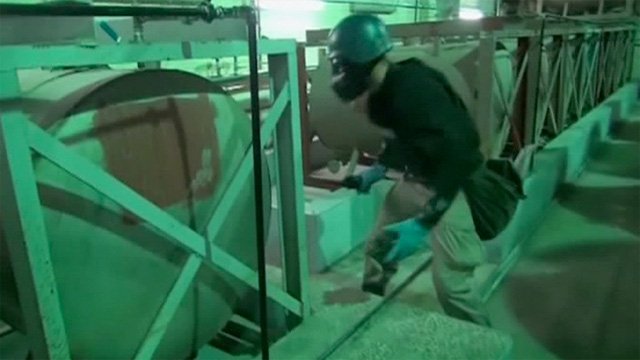
Syria’s declared equipment for producing, mixing and filling chemical weapons has been destroyed
Syrian government denies the accusations.
The inspections were agreed between Russia and the US after Washington threatened to use force in Syria.
The US says more than 1,400 people were killed during a nerve agent attack in Ghouta on the outskirts of Damascus on August 21.
Syria and Russia believe rebel groups were responsible for the attack.
Syria’s chemical weapons arsenal is believed to include more than 1,000 tonnes of the nerve gas sarin, the blister agent sulphur mustard and other banned chemicals, stored at dozens of sites.
It has until mid-2014 to destroy its chemical weapons stockpile.
The WHO has confirmed 10 cases of polio in Syria – the first outbreak in the country in 14 years.
The WHO says a further 12 cases are still being investigated. Most of the 22 people who have been tested are babies and toddlers.
Before Syria’s civil war began in 2011, some 95% of children were vaccinated against the disease.
The UN now estimates 500,000 children have not been immunized.
The WHO said the suspected outbreak centres on the eastern province of Deir Ezzor.
The highly contagious disease is most often spread by consuming food or liquid contaminated with faeces.
“Of course this is a communicable disease, with population movements it can travel to other areas. So the risk is high for [its] spread across the region,” the Reuters news agency quotes WHO spokesman Oliver Rosenbauer as saying in Geneva.
“Immunizations have started in that area,” he said.
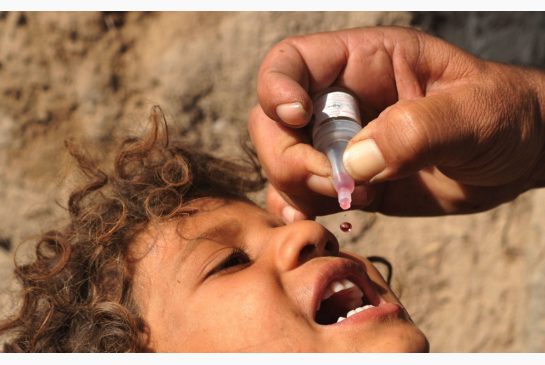
The WHO has confirmed 10 cases of polio in Syria
There are more than 100,000 children, all under age five, now at risk of polio in Deir Ezzor province alone, which has been caught in fierce battles between Syrian government forces and opposition fighters.
The city of Deir Ezzor remains partially controlled by forces loyal to President Bashar al-Assad, while the countryside is in the hands of the opposition.
More than 4 million Syrians have been displaced internally by the conflict and generally live in overcrowded, unsanitary conditions.
A further two million have fled the country, many of them living in refugee camps in Jordan, Lebanon, Turkey and Egypt.
The WHO has already reported increases in cases of measles, typhoid and hepatitis A.
Since the first suspected polio case was reported 10 days ago, Syria’s Health Ministry has begun an immunization drive and aid agencies have begun developing emergency immunization plans at Syrian refugee camps.
Oliver Rosenbauer said most victims were under two years old and were thought never to have been vaccinated against polio.
“The next step will be to look genetically at these isolated viruses and where they came from. That should give some clarity on the origin,” he said.
Polio has been largely eradicated in developed countries but remains endemic in Nigeria, Pakistan and Afghanistan.
There is no known cure, though a series of vaccinations can confer immunity.
Young children are particularly susceptible to paralytic polio, the most serious form of the disease.
What is polio?
- Polio (poliomyelitis) mainly affects children aged under five
- It is a highly infectious disease caused by a virus which invades the nervous system
- Symptoms include fever, fatigue, headache, vomiting, stiffness in the neck, and limb pain
- One in 200 infections leads to irreversible paralysis
- Between 5-10% of those who suffer paralysis die because their breathing muscles are immobilized
- Cases have fallen by over 99% since 1988, from around 350,000 then to 223 in 2012
- However polio remains endemic in Afghanistan, Nigeria and Pakistan
Source: World Health Organization
[youtube fa15uarEuPw 650]
Syrian Kurdish fighters have taken control of Yarubiya border crossing with Iraq from Islamist rebel groups.
The Yarubiya border post was captured after three days of clashes with groups linked to al-Qaeda, the fighters said.
Officials on the Iraqi side of the border said they could hear heavy gunfire and shelling.

Syrian Kurdish fighters have taken control of Yarubiya border crossing with Iraq from Islamist rebel groups
Kurdish groups in northern Syria have tried to stay out of the civil war between the government and rebels.
However, as Islamist rebel groups have moved into Kurdish-controlled areas in recent months, clashes between them and Kurdish militias have been increasing.
An Iraqi official told the Associated Press that the Baghdad government had brought Iraqi reinforcements to its side of the border to prevent the violence spilling over.
He described the fighting as “heavy battles in which all types of weapons were used”.
The border crossing was under the Syrian government’s control until March, when it was taken by Islamist rebels.
Syria’s Kurdish minority makes up around 10% of the population and is largely concentrated in the country’s far north-east, near the borders with Turkey and Iraq.
The fighting between jihadist rebels and armed Kurdish militia – both of whom are anti-government – adds another layer to Syria’s complex civil war.
[youtube xO9yP1B4A2Y 650]
A suicide truck bomb has killed at least 30 people in the central Syrian city of Hama.
State news agency Sana said Syrian rebels had driven a truck laden with over a tonne of explosives into a government checkpoint on a busy road.
The explosion appears to have set ablaze a nearby petrol tanker, increasing the damage and casualties.
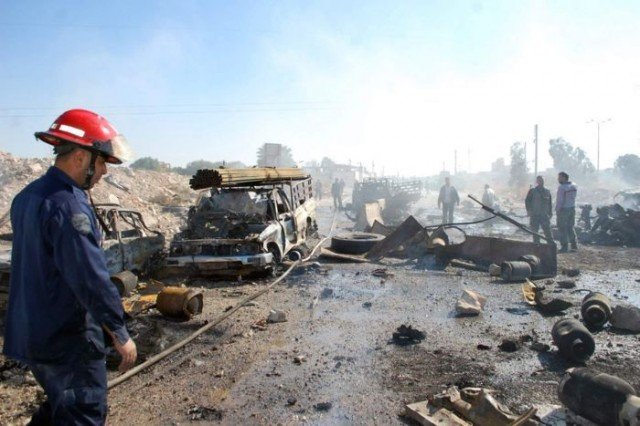
A suicide truck bomb has killed at least 30 people in the central Syrian city of Hama
According to Syrian Observatory for Human Rights, the al-Qaeda-linked al-Nusra Front carried out the attack.
“A man detonated a truck laden with explosives at a checkpoint near an agricultural vehicles company on the road linking Hama to Salamiya,” the Observatory said.
It said the attack had targeted government soldiers, but that most of the dead were civilians.
Pictures on Syria TV showed firemen battling to contain fires as black smoke rose from charred trucks and cars.
Hama saw some of the largest demonstrations against the rule of President Bashar al-Assad in the first months after the Syrian uprising began in March 2011.
But in late summer 2011, security forces stormed the city and have maintained control ever since.
Hama occupies a significant place in the history of modern Syria. In 1982, then-President Hafez al-Assad, father of Bashar, sent in troops to quell an uprising by the Sunni opposition Muslim Brotherhood. Tens of thousands were killed and the town flattened.
[youtube OyalnnoOBPc 650]
Nine Lebanese Shia pilgrims kidnapped by Syrian rebels in May 2012 have been released and arrived back in Beirut.
There were jubilant scenes as they were greeted on the tarmac by family members and Lebanese politicians.
Two Turkish pilots who were being held hostage in Lebanon were also freed as part of a complex swap.
Murat Akpinar and Murat Agca were seized in Beirut in August in a retaliatory abduction.
They were met by their relatives and Turkish PM Recep Tayyip Erdogan after flying to Istanbul on a Qatari jet late on Saturday.
A third part of the hostage negotiations – reportedly mediated by Qatar, Turkey and the Palestinian Authority – involved the release of a number of female prisoners being held by the Syrian government.

Nine Lebanese Shia pilgrims kidnapped by Syrian rebels in May 2012 have been released and arrived back in Beirut
It is not yet clear whether that has taken place.
The Lebanese group, all men, were released by their captors on Friday evening and driven to Istanbul, from where they flew to Beirut.
At the airport they were greeted by friends and family, as well as politicians and religious leaders.
The men appeared tired but in good health.
The nine Lebanese were among 11 people seized while making their way back to Lebanon after a tour of holy sites in Iran. Two of them escaped.
They were reportedly being held in northern Syria by fighters from a Sunni-based rebel group opposed to President Bashar al-Assad.
The rebels insisted their hostages were fighters with the Lebanese Shia militant group Hezbollah, and were demanding the release of women detainees held by the Syrian regime in exchange.
Then in August, Murat Akpinar and Murat Agca were seized from a bus close to Beirut’s international airport. A previously unknown group called Zuwwar al-Imam Rida said it had kidnapped them, and that they would be freed if the Lebanese group were set free.
It demanded that Turkey used its influence with Syrian rebels to make the swap possible.
[youtube Pn8YJVW4dW0 650]
The Syrian Observatory for Human Rights said at least 16 Syrian soldiers have been killed in a suicide bombing and fighting that followed in Damascus suburb of Jaramana.
The blast triggered clashes at a checkpoint near the mainly-Christian area of Jaramana, activists say.
State media blamed “terrorists” for the explosion but did not give details.
Earlier, the US urged the Syrian government to allow aid to reach starving civilians in Damascus.
Washington said the army’s months-long siege left many people in rebel-held areas in desperate need of food, water and medicine.
The UK-based Syrian Observatory for Human Rights, which relies on a network of activists inside Syria, said the suicide car bombing by the al-Qaeda-linked Nusra Front triggered heavy fighting at a key checkpoint between Jaramana and the rebel-held town of Mleha.
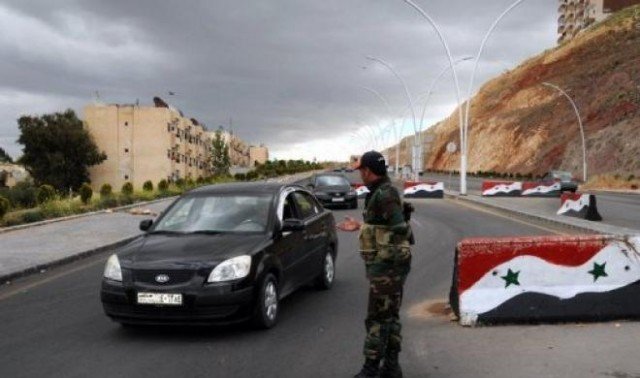
At least 16 Syrian soldiers have been killed in a suicide bombing and fighting that followed in Damascus suburb of Jaramana
It said rebels fired rockets into Jaramana during the fighting and Syrian fighter jets retaliated by striking nearby opposition-held areas.
The report could not be confirmed.
Rebels control much of the countryside around Damascus but Jaramana – a Christian and Druze area mostly loyal to President Bashar al-Assad – is still held by the government.
In August a car bomb in the suburb killed 18 people.
President Bashar al-Assad has drawn support from Syria’s ethnic and religious minorities, including Christians and members of his Alawite sect, an offshoot of Shia Islam.
The rebel movement is dominated by Sunni Muslims, who are a majority in Syria.
In a statement on Friday, US State Department spokeswoman Jen Psaki said: “We call on the Syrian regime to immediately approve relief convoys.”
And she warned that “those who are responsible for atrocities in the Damascus suburbs and across Syria must be identified and held accountable”.
At least three of Damascus’s suburbs – Yarmouk, Eastern Ghouta and Moudamiyah – have been besieged by government forces for several months.
Gunmen have abducted six of the International Committee of the Red Cross (ICRC) workers and one Red Crescent volunteer in north-west Syria.
The aid agency has had no contact with the gunmen, an ICRC spokesman says.
Earlier, Syrian state media said gunmen had opened fire on Red Cross staff travelling on the road between Sirmin and Saraqeb in Idlib province.
The ICRC says it has been struggling to gain access across Syria to provide aid to injured and displaced people.
“I am able to confirm that six ICRC staff members and one Syrian Arab Red Crescent volunteer have been abducted near Idlib in north-western Syria,” ICRC spokesman Ewan Watson told Reuters.
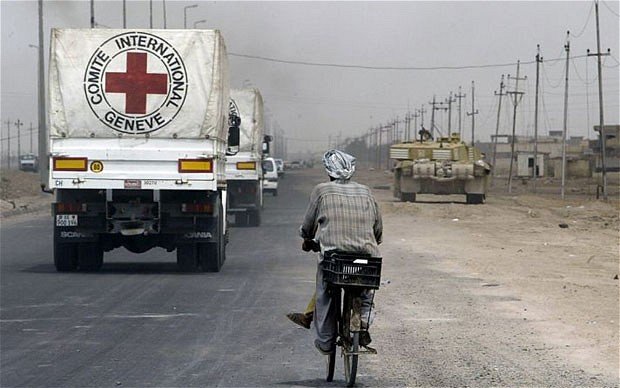
Gunmen have abducted six of the ICRC workers and one Red Crescent volunteer in north-west Syria
“We are calling for their immediate and unconditional release of this team which was delivering humanitarian assistance to those most in need – and we do that on both sides of the frontlines,” he said.
Ewan Watson declined to reveal the identity, gender or nationality of the abducted workers but they are believed to include both local and international staff, who are mainly medical specialists.
Syrian state news agency Sana earlier quoted an unnamed official as saying the workers were abducted and taken to an unknown location after gunmen blocked their path and shot at their convoy.
Ewan Watson was unable to confirm whether or not shots had been fired, but he said the team’s vehicles were also missing.
An ICRC statement said the vehicles they were travelling in had been clearly marked with the Red Cross emblem, “which is not a religious symbol”.
Another ICRC spokesman, Simon Schorno, told Associated Press the attack took place at around 11:30 on Sunday as the team was returning to Damascus.
Simon Schorno said the team had been in the field since October 10 to assess the medical situation and deliver aid in what he described as “a difficult area to go in”.
It is not yet clear who carried out the kidnapping, but Syrian state TV blamed it on what it called “armed terrorists” – a term it frequently uses to describe anti-government rebels.
On Saturday, the Syrian government began the evacuation of around 1,500 civilians, mainly women and children, from a rebel-held Damascus suburb besieged by the army for months.
Many of those coming out of Muadhamiya, south-west of Damascus, were said to be exhausted and traumatized.
US Secretary of State John Kerry has said Syrian government deserves credit for so far complying with a chemical weapons deal.
John Kerry was speaking after international monitors began the destruction of Syria’s stockpile.
The mission was established under a UN resolution, which was passed after a deal between Russia and the US.
The initiative followed international outrage at a chemical weapons attack near Damascus in August.
“The process has begun in record time and we are appreciative for the Russian co-operation and obviously for the Syrian compliance,” John Kerry said after talks with his Russian counterpart Sergei Lavrov on the sidelines of the Asia-Pacific Economic Co-operation (APEC) summit in Bali, Indonesia.
“I think it’s extremely significant that yesterday, Sunday, within a week of the (UN) resolution being passed, some chemical weapons were being destroyed.
“I think it’s a credit to the Assad regime, frankly. It’s a good beginning and we welcome a good beginning.”
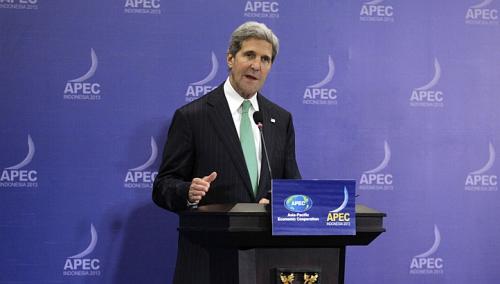
John Kerry has said Syrian government deserves credit for so far complying with a chemical weapons deal
The destruction of Syria’s chemical arsenal is being overseen by a team from the Organization for the Prohibition of Chemical Weapons (OPCW).
An official on the joint OPCW-UN delegation said on Sunday: “The first day of destruction and disabling is over and missile warheads, aerial bombs, along with mobile and static mixing and filling units, were dealt with. Work continues tomorrow and in the next few days.”
The actual destruction of the stockpile, being carried out by the Syrians, is not expected to be straightforward, as some sites are in combat zones.
It is the first time the OPCW – based in The Hague – has been asked to oversee the destruction of a chemical weapons armory during a conflict.
The Syrian government gave details of its chemical weapons arsenal last month to the OPCW under the Russia-US agreement which also provided for Damascus to join the Chemical Weapons Convention.
That arsenal is thought to include more than 1,000 tonnes of sarin and the blister agent sulphur mustard among other banned chemicals.
In an interim report earlier this year, UN chemical weapons inspectors confirmed that the nerve agent sarin had been used in the attack in Ghouta on the outskirts of Damascus on August 21.
It was estimated to have killed hundreds of people and was blamed by the US and other Western powers on the regime of Bashar al-Assad. But he accuses Syrian rebels of being behind it.
Under the terms of the US-Russia deal, Syria’s chemical weapons capability should be removed by the middle of 2014.
[youtube VgJkZoBm5bA]
The OPWC monitors have announced that the destruction of Syria’s chemical weapons has begun.
The operation is being overseen by a team from the Organization for the Prohibition of Chemical Weapons (OPCW).
The mission was established under a United Nations resolution, which was passed after agreement between Russia and the US.
The resolution followed international outrage at a chemical weapons attack near Damascus in August.
In an interim report, UN chemical weapons inspectors confirmed that the nerve agent sarin had been used in the attack in Ghouta on the outskirts of the city on August 21.
It was estimated to have killed hundreds of people and was blamed by the United States and other Western powers on the regime of Bashar al-Assad. But he accuses Syrian rebels of being behind it.
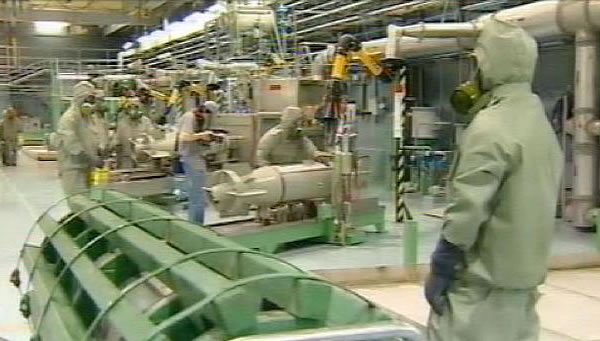
Syria’s chemical arms destruction is being overseen by a team from the Organization for the Prohibition of Chemical Weapons
“Today is the first day of destruction, in which heavy vehicles are going to run over and thus destroy missile warheads, aerial chemical bombs and mobile and static mixing and filling units,” a source with the inspection operation told the French AFP news agency.
It is not clear at which of the chemical weapons sites declared by the government, thought to number about 20, that Sunday’s operation is taking place.
The destruction of the stockpile, being carried out by the Syrians, is not expected to be straightforward, as some sites are in combat zones.
It is the first time the OPCW – based in The Hague – has been asked to oversee the destruction of a chemical weapons armory during a conflict.
The Syrian government gave details of its chemical weapons arsenal last month to the OPCW under the Russia-US agreement which also provided for Damascus to join the Chemical Weapons Convention.
That arsenal is thought to include more than 1,000 tonnes of sarin and the blister agent sulphur mustard among other banned chemicals.
Under the terms of the agreement between the US and Russia Syria’s chemical weapons capability should be removed by the middle of 2014.
[youtube Y1uYIkwGCjc]
Syria’s President Bashar al-Assad has raised the possibility of Germany acting as a mediator to try to end his country’s 30-month-long civil war.
Speaking to Germany’s Der Spiegel magazine, Bashar al-Assad said he “would be delighted if envoys came from Germany”.
But he stressed that Damascus would not negotiate with rebels unless they laid down their weapons.
Bashar al-Assad again denied claims that his troops had used chemical weapons, blaming the rebels instead.
In the interview to be published on Monday, Bashar al-Assad said that President Barack Obama had “not even a whisper of proof” that Damascus had used chemical weapons.
“He has nothing to offer other than lies.”
Bashar al-Assad contrasted Washington’s stance with that of Moscow, describing the Russians as “true friends”.

Bashar al-Assad has raised the possibility of Germany acting as a mediator to try to end Syria’s 30-month-long civil war
The interview comes just days after a team given the job of eliminating Syria’s chemical weapons said it had made “encouraging initial progress” after talks with government officials.
UN-backed experts from the Organization for the Prohibition of Chemical Weapons (OPCW) said Syrian documents handed over last Wednesday “looked promising”.
The team said analysis of technical diagrams would be necessary and “more questions remain to be answered”.
Onsite inspections and arms disabling are scheduled to start next week.
Concerted international action to disarm Syria of its chemical weapons was agreed by the UN Security Council last month.
Its resolution was based on an earlier deal reached by the United States and Russia in Geneva.
The US had threatened military action to punish the Syrian government over a nerve agent attack in Ghouta on the outskirts of Damascus on August 21.
The Americans said more than 1,400 people were killed. Russia and Syria believe rebel groups were responsible for the attack.
Syria’s chemical weapons arsenal is believed to include more than 1,000 tonnes of the nerve gas sarin, the blister agent sulphur mustard and other banned chemicals stored at dozens of sites.
Syria has given Russia new “material evidence” that rebels have used chemical weapons, a Russian minister has said.
Deputy Foreign Minister Sergei Ryabkov also said a report by UN inspectors on the alleged use of chemical weapons was “politicized, biased and one-sided”.
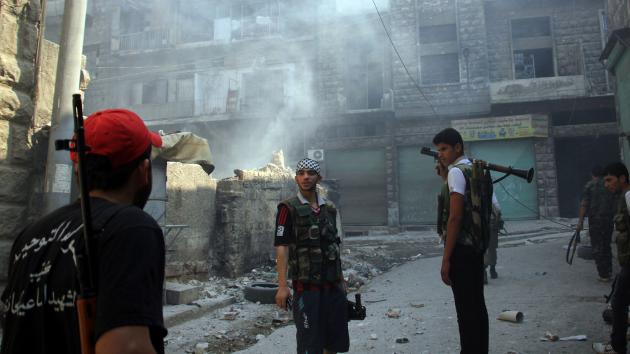
Syria has given Russia new “material evidence” that rebels have used chemical weapons
Sergei Ryabkov said the inspectors had only looked at evidence of an alleged attack on August 21, not three previous incidents.
The UN team found that the nerve agent Sarin was used in the August 21 attack.
The report, however, did not apportion blame for the attack but Western nations blame the government forces of Syrian President Bashar al-Assad.
Damascus – backed by Russia – says opposition forces are to blame.
[youtube 7PawEKRbacU]
A UN report has confirmed “unequivocally and objectively” that chemical weapons have been used in Syria.
The report says sarin gas was used in a rocket attack in the Syrian capital, Damascus, last month, although it has not attributed blame.
“This is a war crime,” Secretary-General Ban Ki-moon said.
US allegations that the government was responsible led to threats of military action and then a US-Russia deal for Syria to make safe its chemical arms.
World powers will now try to hammer out a UN Security Council resolution.
Earlier, UN investigators said they were probing 14 alleged chemical attacks in Syria since September 2011.
Meanwhile, Turkey said it had shot down a Syrian helicopter close to its border. Deputy PM Bulent Arinc said the aircraft was engaged by fighter jets after violating Turkish air space.
Ban Ki-moon has been briefing the Security Council on the report, and is then expected to address the media.
He said he was submitting the UN mission’s report “with a heavy heart”.
“The mission has concluded that chemical weapons were used on a relatively large scale in the Ghouta area of Damascus [on 21 August]… The attack resulted in numerous casualties, particularly among civilians.”
Ban Ki-moon spoke of the suffering of the victims.
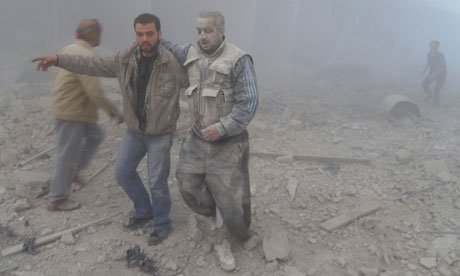
UN report confirms sarin gas was used in a rocket attack in Damascus last month
“Survivors reported that following an attack with shelling, they quickly experienced a range of symptoms, including shortness of breath, disorientation, eye irritation, blurred vision, nausea, vomiting and general weakness.
“Many eventually lost consciousness. First responders described seeing a large number of individuals lying on the ground, many of them dead or unconscious.”
The UN investigators examined many samples from the scene.
Ban Ki-moon said: “On the basis of its analysis, the mission concluded that it – and I quote – <<collected clear and convincing evidence that surface-to-surface rockets containing the nerve agent sarin were used in the Ein Tarma, Moadamiyah and Zalmalka in the Ghouta area of Damascus>>.”
Ban Ki-moon added: “I trust all can join me in condemning this despicable crime. The international community has a responsibility to hold the perpetrators accountable.”
He said the mission was unable to verify the number of casualties, but referred to the “terrible loss of life on 21 August”.
He added: “This is the most significant confirmed use of chemical weapons against civilians since Saddam Hussein used them in Halabja in 1988.”
Assigning blame for the attack in Ghouta was not part of the inspectors’ remit.
However, diplomats have suggested the way the facts are reported may point to the Syrian government as the perpetrators.
Syrian President Bashar al-Assad has denied allegations his government was behind the attack, instead blaming the rebels.
Earlier, Paulo Pinheiro, the chairman of the UN Commission of Inquiry on Syria, said the commission had been investigating 14 alleged chemical attacks since it began monitoring Syrian human rights abuses in September 2011.
Paulo Pinheiro said investigators had not so far been able to assign blame and were awaiting details from Monday’s UN report.
He said the commission believed both President Assad’s government and the rebels were responsible for war crimes, but that the regime alone had perpetrated crimes against humanity.
War crimes, including mass executions, rape and torture, were continuing, the commission said.
Its investigators said a referral to the International Criminal Court was imperative.
French President Francois Hollande and his Foreign Minister Laurent Fabius earlier met British Foreign Secretary William Hague and US Secretary of State John Kerry in Paris on Monday to discuss the Syrian crisis.
The UN Security Council is expected to draft a resolution in the coming days.
[youtube UW8CFk3E-Ic]
President Barack Obama’s plans for a military strike on Syria have won backing from key US political figures.
Barack Obama said a “limited” strike was needed to degrade President Bashar al-Assad’s capabilities in response to an alleged chemical weapons attack.
Key Republican leaders John Boehner and Eric Cantor both signaled their support for military action. Congress is expected to vote next week.
The UN earlier confirmed that more than two million Syrians were now refugees.
More than 100,000 people are thought to have died since the uprising against President Bashar al-Assad began in March 2011.
President Barack Obama and Vice-President Joe Biden met House Speaker John Boehner, House Democratic Leader Nancy Pelosi and the chairmen and ranking members from the national security committees in Washington on Tuesday.
John Boehner signaled his support for Barack Obama’s call for action, saying that only the US had the capacity to stop President Bashar al-Assad. John Boehner urged his colleagues in Congress to follow suit.
Eric Cantor, the House of Representatives majority leader, said he also backed Barack Obama.
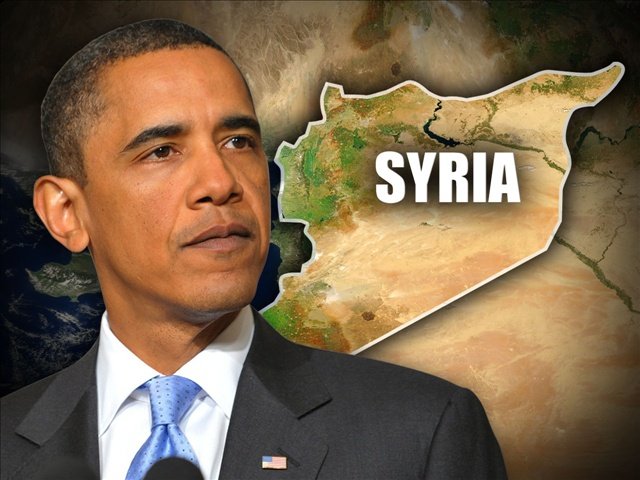
President Barack Obama’s plans for a military strike on Syria have won backing from key US political figures
The Virginia Republican said: “Assad’s Syria, a state sponsor of terrorism, is the epitome of a rogue state, and it has long posed a direct threat to American interests and to our partners.”
Nancy Pelosi said she did not believe Congress would reject a resolution calling for force.
Barack Obama said that Bashar al-Assad had to be held accountable for the chemical attack and that he was confident Congress would back him.
He said he was proposing military action that would degrade Bashar al-Assad’s capacity to use chemical weapons “now and in the future”.
“What we are envisioning is something limited. It is something proportional,” the president said.
“At the same time we have a broader strategy that will allow us to upgrade the capabilities of the opposition.”
Secretary of State John Kerry, Defence Secretary Chuck Hagel and the top US military officer, Gen Martin Dempsey, are appearing before the Senate Committee on Foreign Relations.
John Kerry told the panel that US allies such as Israel and Jordan were “one stiff breeze” away from potentially being hurt by any fresh chemical weapons attacks, and that US inaction would only embolden the Syrian president.
“This is not the time for armchair isolationism,” John Kerry said.
“This is not the time to be spectators to slaughter. Neither our country nor out conscience can afford the cost of silence.
“We have spoken up against unspeakable horror many times in the past. Now we must stand up and act.”
But John Kerry said again that there would be no American boots on the ground in Syria and that Barack Obama was “not asking America to go to war”.
Chuck Hagel said that “the word of the United States must mean something” and echoed John Kerry when adding: “A refusal to act would undermine the credibility of America’s other security commitments, including the president’s commitment to prevent Iran from acquiring a nuclear weapon.”
There will also be a classified briefing for all members of Congress.
Barack Obama will head to Sweden late on Tuesday for a G20 meeting sure to be dominated by Syria.
France has strongly backed the US plan for military action.
President Francois Hollande said on Tuesday: “When a chemical massacre takes place, when the world is informed of it, when the evidence is delivered, when the guilty parties are known, then there must be an answer.”
Francois Hollande called for Europe to unite on the issue, but said he would wait for the Congress vote.
[youtube N3Es9-e3Hww]
Pope Francis has called on all people of faith, regardless of religious sect or affiliations, to observe Saturday, September 7, as a global day of prayer and fasting for Syria.
The pontiff condemned the use of chemical weapons as a means to settle any domestic or international conflict.
On September 7, staring 7 PM until midnight at St Peter’s Square, Pope Francis asked each and every religious person and those against war to join him “gather together in prayer, in a spirit of penitence, to ask from God this great gift [of peace] for the beloved Syrian nation and for all the situations of conflict and violence in the world.”
“Never again war!” Pope Francis said.
The pontiff referred to the Second World War of 1939 to 1945 of which he was able to personally witness the destruction, loss of lives as well as after effects as rehabilitation and rebuilding started to take place.
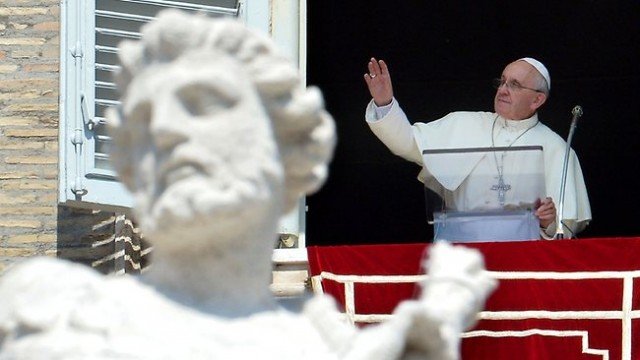
Pope Francis has called on all people of faith, regardless of religious sect or affiliations, to observe September 7, as a global day of prayer and fasting for Syria
Pope Francis was born on December 17, 1936.
“War brings on war! Violence brings on violence,” he said.
“We want a peaceful world.
“We want to be men and women of peace.”
Pope Francis continued to urge both sides that any conflict will not be ended with another conflict. Instead, “listen to the voice of their conscience and with courage take up the way of negotiations”.
“Humanity needs to see these gestures of peace and to hear words of hope and peace!” he said.
“All men and women of good will are bound by the task of pursuing peace.
“I forcefully condemn the use of chemical weapons.
“I tell you I have impressed in my mind and heart the images of what happened in the last days.
“There is the judgment of God, and also the judgment of history, upon our actions from which there is no escaping.”
[youtube LZYQ1258CuM]
President Barack Obama says he will seek congressional authorization for taking military action against Syria.
The US says the Syrian government carried out chemical weapons attacks on August 21 in which 1,429 people died.
Barack Obama said the operation would be limited in duration and strong to deter future chemical attacks. Congress is due to re-open on September 9.
The Syrian government denies it was behind the attacks and blames rebels.
UN inspectors have now left Syria with samples from site visits, which will go to laboratories in Europe for testing.
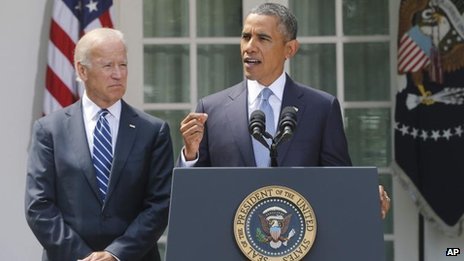
President Barack Obama says the US should take military action against Syria
President Barack Obama said the military operation could happen tomorrow, next week or in the near future.
“We cannot and will not turn a blind eye to what happened in Damascus,” he said.
As commander-in-chief, Barack Obama has the constitutional authority to order military action without the backing of Congress.
However, he said it was important to have the debate.
Last week, British MPs defeated a government motion to take military action in Syria.
Russian President Vladimir Putin has challenged the US to present to the UN evidence that Syria attacked rebels with chemical weapons.
Vladimir Putin said it would be “utter nonsense” for Syria’s government to provoke opponents with such attacks.
Russia – a key ally of Syria – has previously warned that “any unilateral military action bypassing the UN Security Council” would be a “direct violation of international law”.
Moscow, along with China, has vetoed two previous draft resolutions on Syria.
[youtube DUtm0Q93Zt0]
President Vladimir Putin has challenged the US to present to the UN evidence that Syria attacked rebels with chemical weapons near Damascus.
The Russian president said it would be “utter nonsense” for Syria’s government to provoke opponents with such attacks.
President Barack Obama says he is considering military action against Syria after intelligence reports that 1,429 people were killed on August 21.
UN weapons inspectors have left Syria after gathering evidence for four days.
They are taking their samples to the Organization for the Prevention of Chemical Weapons, in The Hague.
The samples are thought to include soil, swabs from munitions, blood and hair from the victims and, experts say, possibly even flesh from dead bodies.
The US says hundreds of children were among those killed in the suspected chemical weapons attacks, which the US says was carried out by the Syrian government.
Syria said the US claim was “full of lies”, blaming rebels for the attacks.
President Barack Obama said on Friday the US was planning a “limited, narrow” military response that would not involve “boots on the ground”.
The inspectors’ departure from Syria removes both a practical and a political obstacle to the launch of US-led military action, correspondents say.
Syrian people are worried and are making preparations.
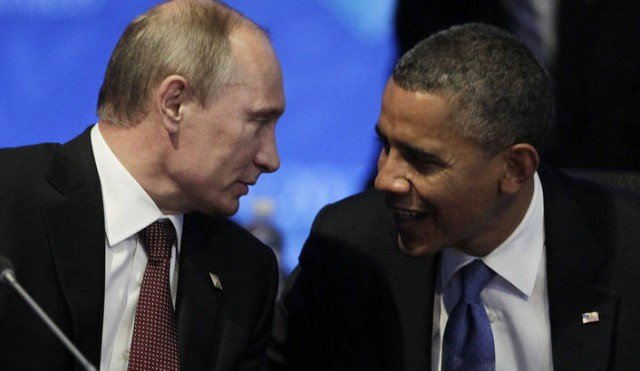
Vladimir Putin urged Barack Obama, as a Nobel Peace Prize laureate, to think about future victims in Syria before using force
They do not know what Barack Obama means by a limited attack and what consequences it will have for them.
Speaking to journalists in the Russian far-eastern city of Vladivostok, Vladimir Putin urged Barack Obama – as a Nobel Peace Prize laureate – to think about future victims in Syria before using force.
The Russian president said it was ridiculous to suggest the Syrian government was to blame for the attack.
“Syrian government troops are on the offensive and have surrounded the opposition in several regions,” Vladimir Putin said.
“In these conditions, to give a trump card to those who are calling for a military intervention is utter nonsense.”
“So I’m convinced that is nothing more than a provocation by those who want to drag other countries into the Syrian conflict.”
Vladimir Putin said that the US failure to present evidence to the international community was “simply disrespectful”.
“If there is evidence it should be shown. If it is not shown, then there isn’t any,” he said.
Russia – a key ally of Syria – has previously warned that “any unilateral military action bypassing the UN Security Council” would be a “direct violation of international law”.
Moscow, along with China, has vetoed two previous draft resolutions on Syria.
Vladimir Putin also expressed surprise at a vote in the British parliament on Thursday ruling out participation in military action.
“I will be honest: this was completely unexpected for me,” he said.
“This shows that in Great Britain, even if it is the USA’s main geopolitical ally in the world… there are people who are guided by national interests and common sense, and value their sovereignty.”
Meanwhile in France – seen as the main US ally since the UK vote – an opinion poll suggested that 64% opposed the use of force.
Neither France nor the US needs parliamentary approval for military action.
Syrian President Bashar al-Assad has said his country will defend itself against any Western “aggression”.
[youtube oUyPpT0_8Gg]
President Francois Hollande has announced that France is still ready to take action in Syria alongside the US, despite UK MPs blocking British involvement.
Francois Hollande said a military strike within days could not be ruled out.
US Defense Secretary Chuck Hagel said after the UK vote that Washington would continue to seek a coalition.
The UN is investigating claims that the Syrian forces of President Bashar al-Assad used chemical weapons. Bashar al-Assad denies the claims, blaming rebels.
UN chemical weapons inspectors visited a hospital in a government-controlled area of Damascus on Friday.
They are due to give their preliminary findings to UN Secretary General Ban Ki-moon over the weekend.
Francois Hollande told Le Monde newspaper that the UK vote, in which parliament rejected a government motion supporting the principle of military action, made no difference to France’s position.
“Each country is sovereign to participate or not in an operation. That is valid for Britain as it is for France,” he said.
He said that if the UN Security Council was unable to act, a coalition would form including the Arab League and European countries.
“But there are few countries which can have the capacity of enforcing any sanction through the appropriate measures,” he said.
“France will be part of it. France is ready.”
Francois Hollande ruled out strikes while the UN inspectors were in Syria. However he did not rule out the possibility that military action could be taken before next Wednesday, when the French parliament is due to debate the issue.
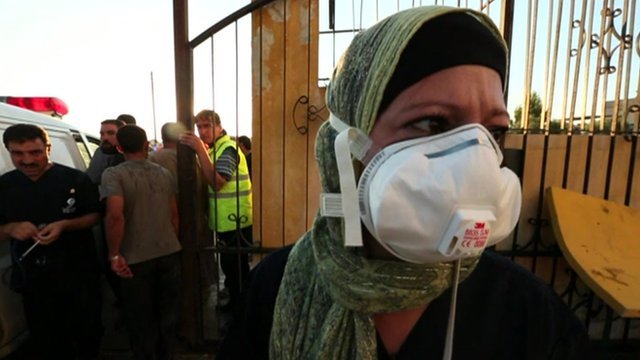
France is still ready to take action in Syria alongside the US, despite UK MPs blocking British involvement
Neither France nor the US need parliamentary approval for action, and Secretary of State John Kerry said the US could not be held to the foreign policy of others.
The UK vote was welcomed in Russia, Syria’s main international ally.
Moscow said it reflected a growing public understanding of the dangers of an attack.
Syrian MPs are also delighted with the UK vote.
They believe a letter they sent to the UK parliament inviting their British counterparts to inspect the evidence of chemical attacks had helped sway the vote against military action.
China, which has vetoed previous UN Security Council resolutions against Syria, reiterated on Friday that no action should be taken until the UN inspectors have reported on their findings.
And Germany said of military action that “such participation has not been sought nor is it being considered”.
Officials in the US and UK had been insistent throughout the week that the Assad regime had carried out a poison-gas attack in eastern Damascus on August 21 in which hundreds were killed.
However, British PM David Cameron told parliament on Thursday he could not be 100% sure.
In the US, government officials briefed a Congressional committee on the case for launching action against Bashar al-Assad’s forces.
Eliot Engel, the top Democratic member on the House Foreign Affairs Committee, told reporters after the briefing that officials had said it was “beyond a doubt that chemical weapons were used, and used intentionally by the Assad regime”.
He said officials had cited evidence including “intercepted communications from high-level Syrian officials”.
Reports in the US media this week described Syrian officials suggesting in phone conversations that the chemical weapons attack had been more devastating than was intended.
More than 100,000 people are estimated to have died since the conflict erupted in Syria in March 2011, and the conflict has produced at least 1.7 million refugees.
Forces which could be used against Syria:
• Four US destroyers – USS Gravely, USS Ramage, USS Barry and USS Mahan – are in the eastern Mediterranean, equipped with cruise missiles. The missiles can also be fired from submarines, but the US Navy does not reveal their locations
• Airbases at Incirlik and Izmir in Turkey, and in Jordan, could be used to carry out strikes
• Two aircraft carriers – USS Nimitz and USS Harry S Truman are in the wider region
• French aircraft carrierCharles de Gaulle is currently in Toulon in the western Mediterranean
• French Raffale and Mirage aircraft can also operate from Al-Dhahra airbase in the UAE
[youtube MN6LpkeRmw0]
Medecins Sans Frontieres reports hospitals it supports in Syria treated about 3,600 patients with “neurotoxic symptoms”, of whom 355 have died.
MSF said the patients had arrived in three hospitals in the Damascus governorate on August 21 – when opposition activists say chemical attacks were launched against rebels.
But MSF says it cannot “scientifically confirm” the use of chemical weapons.
Both sides in the conflict accuse each other of using them.
MSF says staff at the hospitals described a large number of patients arriving in the space of less than three hours with symptoms including convulsions, extreme salivation, contracted pupils and sight and respiratory problems.
The charity said many were treated with atropine, a drug administered to those with “neurotoxic symptoms”.
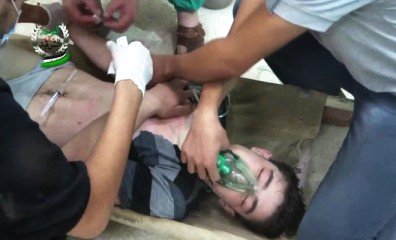
Medecins Sans Frontieres reports hospitals it supports in Syria treated about 3,600 patients with neurotoxic symptoms
“MSF can neither scientifically confirm the cause of these symptoms nor establish who is responsible for the attack,” said MSF Director of Operations Bart Janssens.
“However, the reported symptoms of the patients, in addition to the epidemiological pattern of the events, characterized by the massive influx of patients in a short period of time, the origin of the patients, and the contamination of medical and first aid workers, strongly indicate mass exposure to a neurotoxic agent.
“This would constitute a violation of international humanitarian law, which absolutely prohibits the use of chemical and biological weapons.”
The opposition Syrian Observatory for Human Rights has given its latest assessment of the number of casualties from the alleged attacks.
The British-based group said it estimated that 322 had died, 54 of them children.
In the immediate aftermath, casualty figures varied widely with opposition activists saying between several hundred and more than 1,000 had been killed.
MSF’s disclosure adds to mounting allegations that chemical weapons were used in suburbs to the east of Damascus and in an area to the south-west on August 21.
Unverified video footage posted soon afterwards shows civilians, many of them children, dead or suffering from what appear to be horrific symptoms consistent with a chemical attack.
Rebels and opposition activists accuse forces loyal to President Bashar al-Assad of carrying out such attacks.
But state TV accuses the rebels, saying barrels of chemical weapons were found as troops entered previously rebel-held districts.
Soldiers had “suffocated” as they tried to enter Jobar, one of the towns in the Ghouta district around Damascus.
President Barack Obama has said the alleged use of chemical weapons in Syria in an attack on Wednesday is a “big event of grave concern”.
Barack Obama said the US was still seeking confirmation such weapons were used, but if proved true the situation would “require America’s attention”.
Meanwhile, Syria’s main ally Russia has said there is growing evidence that rebels were behind the attack.
The opposition says hundreds died in a government assault outside Damascus.
But despite calls from many different countries, there is no sign yet that the Syrian authorities will allow a UN inspection team to visit to investigate the claims.
Unverified footage shows civilians – many of them children – dead or suffering from what appear to be horrific symptoms as a result of Wednesday’s attack.
Also on Friday, UN agencies said the number of children forced to flee Syria had reached one million.
The UN’s refugee agency, UNHCR, and children’s fund, Unicef, described the figure as “a shameful milestone”, and said a further two million children were displaced within the country.
Last year, President Barack Obama said the use of chemical weapons in Syria would cross a “red line” and force a tough US response.
Meanwhile, Russia joined calls for an “objective investigation” by UN chemical weapons experts.
Foreign Ministry spokesman Aleksandr Lukashevich said Moscow had urged President Bashar al-Assad to co-operate with a probe, but also that questions remained about the willingness of the opposition to provide “secure, safe access of the [UN] mission to the location of the incident”.
“More new evidence is starting to emerge that this criminal act was clearly provocative,” the ministry added.
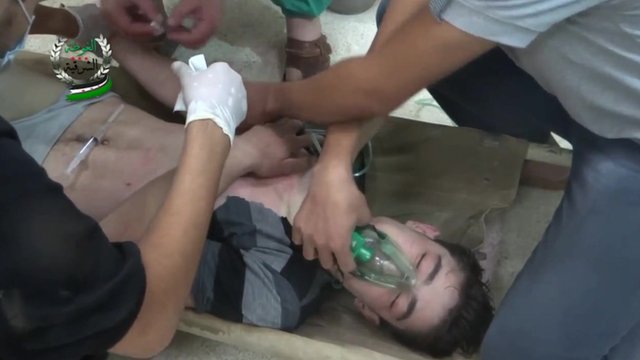
President Barack Obama said the US was seeking confirmation if chemical weapons were used in Damascus attacks
“On the internet, in particular, reports are circulating that news of the incident carrying accusations against government troops was published several hours before the so-called attack. So, this was a pre-planned action.”
The ministry also described as “unacceptable” calls from various European capitals for the UN Security Council to authorize the use of force in Syria.
Other leaders have also pushed for an urgent UN inquiry.
A spokesman for UN Secretary General Ban Ki-Moon said he was “giving his utmost attention to the tragic situation” and intended to conduct a “thorough, impartial and prompt investigation”.
The UN High Representative for Disarmament Affairs, Angela Kane, will travel to Damascus on Saturday to push for access for the UN inspectors.
“It is of paramount importance that all those who share the concern and urgency of investigating these allegations, equally share the responsibility of co-operating in generating a safe environment for the [UN] mission to do its job,” Ban Ki-Moon’s spokesman added.
Damascus has described the allegations that it sanctioned the use of chemical weapons as “illogical and fabricated”.
The main opposition alliance, the National Coalition, has meanwhile said that it will do everything to assist the UN inspectors and ensure their safety.
“It is critical that those inspectors get there within 48 hours. The clock is ticking and we want to see those inspectors and we believe that the evidence will show who used those chemical weapons against innocent civilians,” spokesman Khaled Saleh told the Reuters news agency.
Opposition activists are also reportedly trying to smuggle tissue samples from victims’ bodies to the UN inspectors to prove their claims.
“The UN team spoke with us and since then we prepared samples of hair, skin and blood and smuggled them back into Damascus with trusted couriers,” activist Abu Nidal told Reuters.
[youtube XotP3k2bfjM]
Two huge explosions killed at least 42 people and wounded more than 400 others in Lebanon’s northern city of Tripoli, health officials say.
The explosions are thought to represent the deadliest attack in Lebanon since the end of the civil war in 1990.
As Friday prayers ended, a blast hit the al-Taqwa mosque, which is usually attended by prominent Sunni cleric Sheikh Salem Rafii. He was unharmed.
A second blast five minutes later hit the al-Salam mosque in the Mina area.
War in neighboring Syria has raised sectarian tensions between the city’s Sunni Muslim and Alawite communities.
UN Secretary-General Ban Ki-moon has condemned the attacks and called for calm and restraint.
Sheikh Salem Rafii is one of the most prominent Sunni leaders in Lebanon and is believed to have been a possible target.
He is opposed to Lebanon’s militant Shia Hezbollah group and has previously urged young Lebanese men to join opposition fighters in Syria.
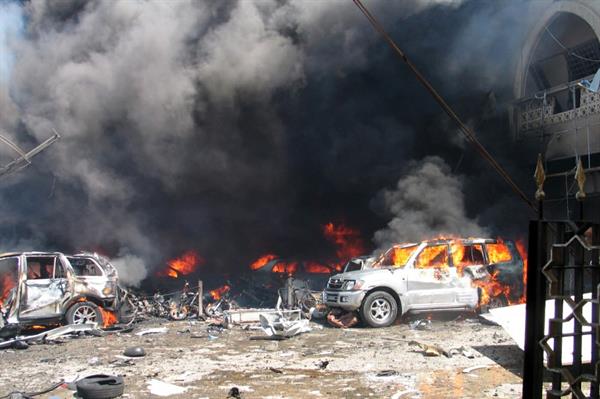
Two huge explosions killed at least 42 people and wounded more than 400 others in Lebanon’s northern city of Tripoli
It is not clear whether he was at the al-Taqwa mosque at the time of the attack, although some reports say he was giving a sermon.
Ambulances rushed to the aftermath of the blasts and heavy black smoke covered the sky.
“It was as if there was an earthquake, the whole city seemed to be shaking,” a local resident told Lebanon’s Daily Star newspaper.
Television pictures showed damaged cars on fire, with their windows smashed, and people running through the streets trying to carry wounded people to safety.
Bodies could be seen on the ground and windows were broken on surrounding apartment blocks.
The preacher at the al-Salam mosque – the site of the second explosion – is also an opponent of the Syrian government and its Lebanese ally, Hezbollah, Associated Press reports.
No group has taken responsibility for the latest attacks.
In a statement reported by Lebanon’s National News Agency, Hezbollah strongly condemned the blasts.
The group said the attacks aimed to “sow seeds of strife among the Lebanese and drag them into bickering under a sectarian guise”.
Outgoing Lebanese PM Najib Mikati and President Michel Suleiman have also condemned the attacks, calling on citizens to unite against violence.
A spokesman for UN Secretary-General Ban Ki-moon said: “The secretary-general calls on all Lebanese to exercise restraint, to remain united, and to support their state institutions… in maintaining calm and order in Tripoli and throughout the country, and in preventing the recurrence of such destructive actions.”
Tripoli, a city of nearly 200,000 people and Lebanon’s second largest, is one of the country’s most volatile sectarian fault lines, with a small Alawite population living in the midst of a Sunni majority.
The Alawite community tends to support Syrian President Bashar al-Assad, with Sunnis mostly backing the rebels fighting him.
The bombs come a week after a massive car bomb rocked a Shia district of Beirut, leaving 27 people dead. The area hit contained Hezbollah strongholds.
[youtube sv0oMu2V36Q]
According to the United Nations, 7.6 million people became refugees in 2012, with the total number now higher than at any time since 1994.
A report from the office of the UN High Commissioner for Refugees (UNHCR) says that Syria is “a major new factor” driving up refugee numbers.
The report say 55% of all refugees come from five countries: Afghanistan, Somalia, Iraq, Sudan and Syria.
It also found that developing countries now hosted 81% of the world’s refugees, 11% more than a decade ago.
“These truly are alarming numbers. They reflect individual suffering on a huge scale and they reflect the difficulties of the international community in preventing conflicts and promoting timely solutions for them,” said UNHCR chief Antonio Guterres.
Antonio Guterres said that the figure of 7.6 million meant there was a new displaced person every 4.1 seconds.
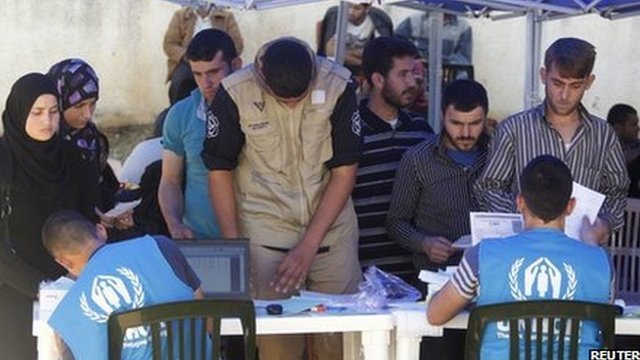
7.6 million people became refugees in 2012, with the total number now higher than at any time since 1994
“Each time you blink another person is forced to flee,” he said.
The UNHCR says the figures are based on data from the agency itself as well as from governments and other NGOs.
Afghanistan remained the world’s biggest source of refugees, a position it has now held for 32 years, with 95% of Afghan refugees located in either Iran or Pakistan.
Somalis were the second biggest group of refugees in 2012, followed by Iraqis. Syrians were the fourth biggest group.
The figures do not, however, reflect the additional one million people who have fled Syria in the last six months.
The UN says if current trends persist, a further 2 million people will have left Syria by the end of this year. In the next few days it is expected to ask European countries to take at least some of them in.
The report also says there has been a marked rise in displacement from Mali and the Democratic Republic of Congo.
Mali’s army, heavily backed by France, has been fighting Islamist and ethnic Tuareg rebels this year. Islamists seized control of the north of the country after a military coup last year.
In the Democratic Republic of Congo, some 800,000 people have fled since fighting broke out last year between government forces and the M23 rebel movement.
[youtube Mv8IIrvs6Ko]
Russia and the United States have agreed to work towards holding an international conference to find a political solution to the conflict in Syria.
Foreign Minister Sergei Lavrov and Secretary of State John Kerry announced it would follow on from an Action Group for Syria meeting in Geneva last June.
John Kerry said they would try to “bring both sides to the table”.
Relations between Moscow and Washington have been strained in the last two years by differences over Syria.
John Kerry held lengthy talks with Russian President Vladimir Putin on Tuesday during his first visit to Moscow since becoming secretary of state.
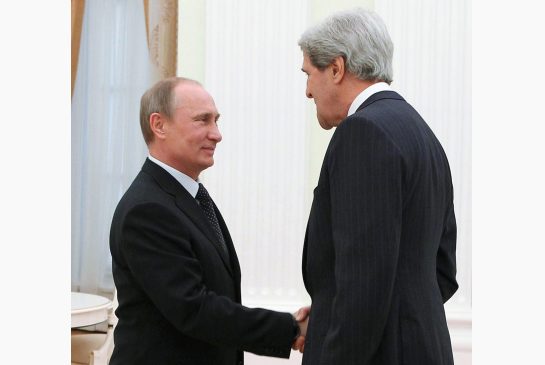
John Kerry held lengthy talks with Russian President Vladimir Putin on Tuesday during his first visit to Moscow since becoming secretary of state
He told Vladimir Putin that their two countries shared “some very significant common interests with respect to Syria”, including “stability in the region” and “not letting extremists create problems”.
“It is my hope that today we will be able to dig into that a little bit, and see if we can find common ground,” he added.
John Kerry then held further discussions with Sergei Lavrov, after which they jointly announced that they would try to organize an international conference on ending the conflict in Syria, if possible before the end of May.
It will try to convince both the Syrian government and opposition to accept a solution based on the core elements of the final communiqué issued on 30 June 2012, after the UN-backed Action Group for Syria meeting in Geneva.
The communiqué called for an immediate cessation of violence and the establishment of a transitional government that could include officials serving under Syrian President Bashar al-Assad and members of the opposition.
“We believe that the Geneva communiqué is the important track to end the bloodshed in Syria,” John Kerry told a news conference.
He added that a negotiated settlement would help avert the danger of Syria breaking up and might influence Washington’s decision on whether or not to arm rebel groups.
Sergei Lavrov reaffirmed Moscow’s belief that the departure of President Bashar al-Assad should not be a condition for peace talks, but insisted he was not trying to keep him in power.
“We are not concerned by the fate of any individual. We are concerned by the fate of the Syrian people,” Sergei Lavrov said.
[youtube SYLhCFUKO_Q]
Syrian state television has reported that Israeli rockets have hit Jamraya army research centre near Damascus.
Witnesses heard huge explosions near the Jamraya facility, and residents said nearby military positions were also hit.
The Jamraya site was the target of an Israeli strike in January.
Earlier, unnamed Israeli officials said that on Friday Israeli aircraft had attacked a shipment of missiles inside Syria.
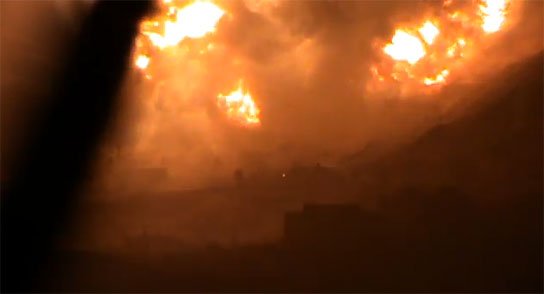
Israeli rockets have hit Jamraya army research centre near Damascus
The missiles were believed to be destined for Hezbollah militants in neighboring Lebanon.
The latest attacks come amid reports of massacres in a campaign of sectarian cleansing near the coastal region of central Syria.
Heavy explosions shook Damascus overnight. Amateur footage posted online claimed to show the blasts at the Jamraya research centre, on Mount Qassioun overlooking Damascus.
Residents said military bases in the area had also been hit.
Syrian state media said the attack showed that there was an organic link between Israel and the rebels.
“The new Israeli attack is an attempt to raise the morale of the terrorist groups, which have been reeling from strikes by our noble army,” state TV said, referring to recent offensives by President Bashar al-Assad’s forces.
The UK-based Syrian Observatory for Human Rights quoted eyewitnesses in the area as saying they saw jets in the sky at the time of the explosions.
There was no immediate comment from Israeli officials on the latest explosions.
Israeli officials have confirmed their forces have carried out two air strikes on Syrian targets this year.
The first attack, in January, apparently targeted the Jamraya facility.
The second, two days ago, targeted a consignment of missiles bound for Lebanon’s Hezbollah.
In a separate development, hundreds of Syrian families have fled the coastal area of central Syria amid reports of massacres.
Activists said that more than 100 people, including women and children, were killed in the Sunni village of al-Bayda and the nearby coastal town of Baniyas.
More than 70,000 people are estimated to have been killed since the conflict erupted in March 2011.
[youtube Vez1o6zEVGM]
 Prev1...456...7Next
Prev1...456...7Next  Page 5 of 7
Page 5 of 7

























